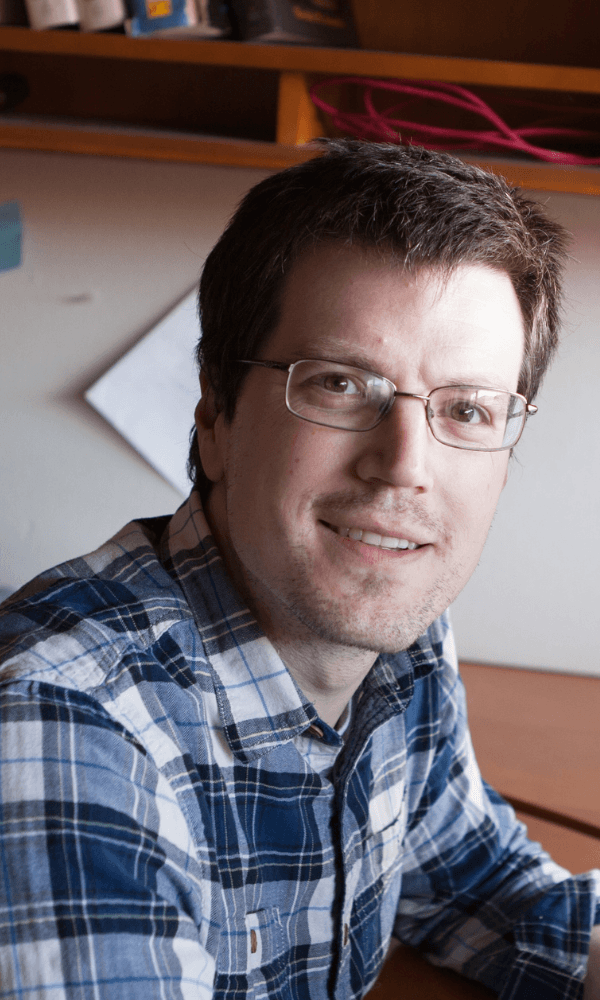BIO STUDIO PROJECT
Modulate
The ‘MODULATE’ project will use protein design to create small therapeutic proteins, called minibinders, that modulate cell signaling by binding the integral membrane domains of key receptors (GPCRs, ion channels, and transporters). The project uses methods pioneered by David Baker’s laboratory at the University of Washington to create their new class of therapeutic proteins to modulate cell signaling.
About the Bio Studio program
The Bio Studio Program supports world-class entrepreneurial academic researchers in translating their science into innovative products and solutions. The program’s projects will join BII and establish a team that will work in BII’s office and lab space alongside other Bio Studio projects and start-ups. Bio Studio projects will be supported by a tailored program to develop the teams’ entrepreneurial and commercial competencies and by dedicated BII anchors to help guide project progression.

"Dr. Frank Dimaio is an Associate Professor at the Institute for Protein Design at the University of Washington. His research is focused on protein structure determination from sparse and noisy experimental data. The methods Frank has developed include tools for solving difficult molecular replacement problems, elucidating more than a dozen structures previously unsolved in the laboratories of expert crystallogr..."
Read more
"Lance Stewart is the Chief Strategy and Operations Officer of the Institute for Protein Design at the University of Washington and an Entrepreneur in Residence at BioInnovation Institute. He is a strong profile with more than 27 years of experience in protein and drug discovery research, life sciences partnering, and entrepreneurial start-up activities. Lance has co-founded several biotechnology companies and i..."
Read morePROJECT FAQ
Interview with Lance Stewart
Why have you decided to join the Modulate project as an Entrepreneur in Residence?
The Modulate project represented an excellent EIR opportunity for me to support the first international translational research collaboration to be partnered with the Institute for Protein Design, where I have had the privilege of mentoring numerous translational investigators and helping to form several Seattle area biotechnology companies.
What is your role as an Entrepreneur in Residence?
As the EIR, my role is to support and mentor colleagues Chris Norn, David Feldman, and Frank DiMaio as they navigate a challenging research agenda, using computational methods to design, screen, and optimize de novo protein therapeutics targeting integral membrane protein targets of high value to the pharmaceutical industry.
What attracted you to become a part of BII’s entrepreneurial community?
BII is making a tremendous investment in support of entrepreneurial endeavors. The Bio Studio program has many thoughtful organizing principles that increase the chances of launching new technology spin-out companies successfully. Also, Copenhagen is a beautiful city.
What are some of the biggest learnings from your career that you bring to your position as an Entrepreneur in Residence?
Over my career, I have learned several fundamental management rules for success in corporate biotechnology, which are passed along as needed. Being a mentor and cheerleader to the team is first and foremost. Using connections and experience to help pave the way through paperwork and resource acquisition is often helpful to translational teams.
Acting as a strict manager is secondary to the above.
What are some of your near-term plans for this new role?
As the project evolves, we will invite a broader network of advisors to provide independent advice, insight, and guidance to the program. We also generate several in-depth target selection assessments covering technical and commercial topics. This ensures we have done our homework well before initiating future conversations with venture capital and pharmaceutical company partners.
How have previous experiences shaped your approach to the role of Entrepreneur in Residence?
Transitioning from a bench scientist to an entrepreneurial translational investigator to form a new biotechnology company is an inspiring -but risky- career move. As such, an EIR should first serve as a mentor, providing examples of success stories for encouragement and advice on how to avoid failing strategies based on experience. This is to give confidence to the team; it can be done, and though it may be a bit scary, you are not in this alone.